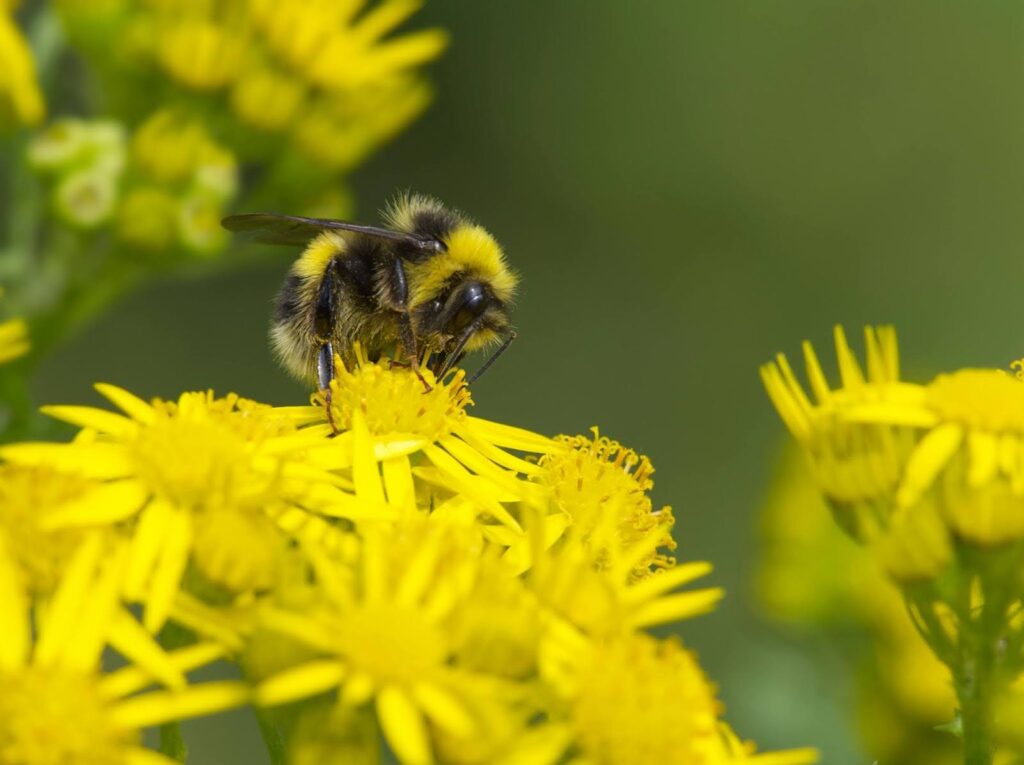To bee, or not to bee, that is the question.
That’s not quite how the famous Shakespeare quote goes, but when it comes to the debate between bumble bees vs. wasps, it really does sum things up quite nicely.
If you’ve recently found your home invaded by uninvited winged guests, you might be confused about what, exactly, you’re up against.
Is it bumblebees, those delightful garden friends and pollinators, or wasps, the aggressive pests that make you want to hide under the table?
Bumble bees and wasps often get lumped together as “those buzzing things,” but they’re as different as night and day. While both play roles in the ecosystem, their behavior and how they interact with humans can be vastly different.
Understanding these differences isn’t just a matter of satisfying your curiosity. It can also help you make more informed decisions when it comes to your garden – and your pest control strategies.
We’ll tell you everything you need to know about the two in this post.
What Are Bumble Bees?
True to their name, bumble bees are the gentle giants of the bee world. These fuzzy, round insects are nature’s diligent workers, crucial for the pollination of many crops and wildflowers.
Typically non-aggressive, bumble bees are more interested in collecting nectar than bothering humans. Their colonies are small, usually no larger than 50 to 400 bees, and they build nests in hidden places like underground tunnels or thick grass.
Here are a few more facts about bumble bees:
- Pollinators Extraordinaire: Bumble bees use a technique called “buzz pollination,” which involves vibrating their bodies to release pollen from flowers—a task that many other pollinators can’t accomplish.
- Solitary Workers: Unlike honeybees, bumble bees don’t produce honey for winter storage, which means they’re less likely to hover around human food.
- Defensive, Not Aggressive: These bees will only sting if provoked, such as when their nest is threatened.
Having bumble bees in your garden is like having a free workforce dedicated to floral beauty and fruit production. Studies show that bumble bees are especially important for tomatoes, blueberries, and squash, among other edible crops.
What Are Wasps?
Wasps are often seen as the misunderstood villains of the insect world.
Unlike bumble bees, wasps can be more aggressive and are known for their painful stings. Wasps can be beneficial too, though, as they help control pest populations by feeding on insects.
However, their tendency to be territorial and scavenging for sugary foods makes them a nuisance during outdoor activities.
Some lesser-known facts about wasps include:
- Predators and Scavengers: Wasps feed on other insects, making them helpful in controlling pests. However, they’re also attracted to sweet foods and drinks, leading them to crash outdoor gatherings.
- Social Structure: Wasps live in colonies that can number up to several thousand individuals. Their nests are usually found in high, sheltered areas.
- Aggressive Defenders: Unlike bumble bees, wasps can sting multiple times and are more aggressive when defending their nests.
Wasps can pose a significant risk, especially to those who are allergic to their venom. Their aggressive nature means they’re more likely to sting, and multiple stings can lead to severe reactions. Identifying and managing wasp nests near homes is crucial for safety.
Identifying Bumble Bees and Wasps
One of the biggest challenges homeowners face is distinguishing between bumble bees and wasps.
The first trick to telling them apart lies in their appearance. Bumble bees are plump, fuzzy, and have a more rounded appearance. They’re usually black with broad yellow or orange bands.
Wasps, on the other hand, are slender, smooth, and shiny. They have narrow waists and are often brightly colored with yellow and black stripes.
Bumble bees nest in the ground or in dense vegetation, while wasps build their nests above ground, often in eaves, attics or trees.
You may also be able to tell these creatures apart based on how they spend their time. In the garden, bumble bees focus on flowers, collecting nectar and pollen. Wasps may hover around any food source, including sugary drinks and meats.
If you’ve identified a wasp infestation, you need to go to great pains to handle it safely. This is where Natura Pest Control comes in.
Specializing in eco-friendly pest management, Natura can remove wasp nests without harming beneficial bumble bee populations. Our team of experts uses safe, effective methods to ensure your garden remains a haven for bees while keeping your family safe from wasps.
Take Action Today
Understanding the difference between bumble bees vs. wasps is more than just an academic exercise. It’s a practical skill that can enhance your enjoyment of outdoor spaces and keep your family safe. Bumble bees are beneficial allies in promoting garden health, while wasps require careful management to prevent them from becoming a threat.
When in doubt, trust the experts. Natura Pest Control in the Vancouver-Portland metro area offers professional services that respect nature while protecting your home.
Don’t wait until the buzz becomes a bother. Contact Natura Pest Control today to schedule a consultation and you’ll be able to keep your garden buzzing – but with the right kind of activity.



